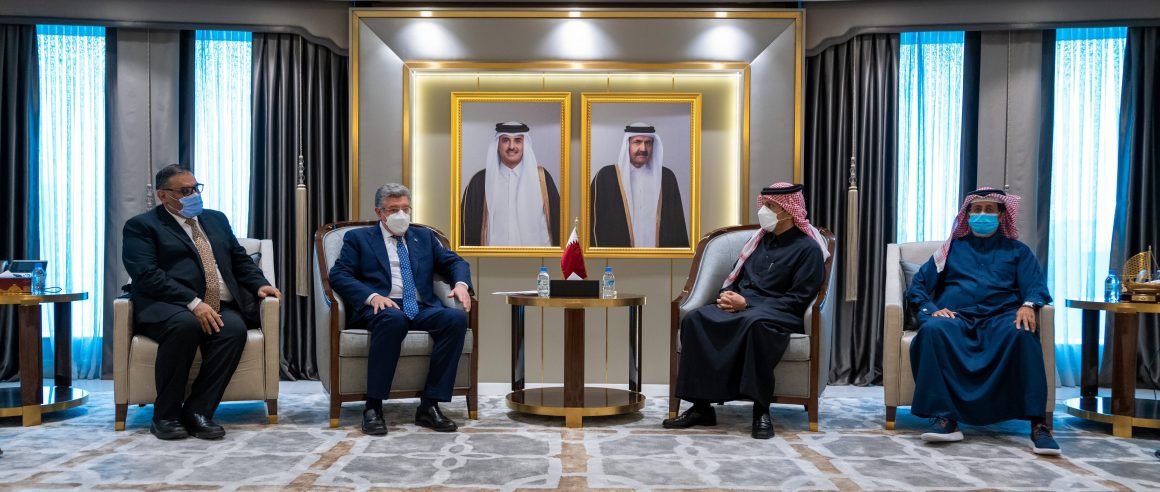The Gulf state has explicitly refused to normalise with the Bashar Al-Assad regime and opposes its return to the Arab League as long as it continues committing war crimes against civilians.
Qatar’s Deputy Prime Minister and Foreign Minister, Sheikh Mohammed bin Abdulrahman Al-Thani, reiterated his country’s support for a political resolution in Syria in meetings that took place in Doha with various officials from the Syrian opposition, on Sunday.
One such meeting was held with the President of the Syrian opposition’s Peace and Freedom Front, Ahmad Al-Assi Al-Jarba, during which Sheikh Mohammed stressed the importance of “reaching a comprehensive ceasefire”, in the war-torn country.
The Qatari foreign minister said that the ceasefire will help contribute to facilitating much-needed humanitarian access to Syria.
Qatar blocking Syria’s return to Arab League: Syrian official
In another meeting, the Qatari diplomat discussed the latest developments in the war-ravaged country with the President of the National Coalition for Syrian Revolutionary and Opposition Forces, Salem Al Meslet, and President of the Syrian Negotiating Commission (SNC), Anas Abdah.
“[Qatar’s foreign minister] stressed the State of Qatar’s position that there must be a political solution in accordance with the Geneva-1 Declaration and the full implementation of Security Council Resolution 2254,” read a statement by Qatar’s Ministry of Foreign Affairs (MOFA).
The meetings come amid a lack of international action regarding the current humanitarian and political situation in Syria as well as a little to no progress in the files of detainees locked behind bars by the Assad regime.
“The humanitarian situation for Syrians is unbearable at all levels…the Syrian opposition is now urged to think of ways to confront this,” Mutasem Syoufi, Executive Director of The Day After Association, told Doha News.
Syoufi also stressed the importance of having a comprehensive national framework that can address all legal, humanitarian, political, and civil issues pertaining the situation in Syria.
Qatar has repeatedly stressed the importance of reaching a political resolution in Syria, that would enable a safe environment for refugees to return while holding the perpetrators of war crimes, in Damascus, accountable.
In March 2021, Qatar, Turkey and Russia announced the launch of a “trilateral consultation process” to end Syria’s decade-old conflict. The announcement came after meetings held in Doha in a bid to break the current deadlock.
Normalisation with the Assad regime
The latest meetings also come as Qatar continues to refuse normalising with the Assad regime for as long as it continues its attacks on Syrian civilians.
Qatar has openly been calling for Assad to step down since the very beginning of the 2011 uprising and was the first Arab country to close its embassy in Damascus—a move that was later replicated by other nations.
The Gulf state has long expressed its objection towards Syria’s return to the Arab League after it was suspended at the height of the Arab Spring.
The suspension came after the Assad regime failed to meet the deadline given by members of the bloc, urging it to halt its crackdown on peaceful protesters who demanded the president’s resignation.
More than a decade on, Syria continues to grapple with a humanitarian crisis as the Assad regime remains in power despite being complicit in ongoing flagrant human rights abuses—including torture of detainees and forced disappearances.
According to the United Nations, the war in Syria has killed 350,000 civilians over the past decade.
Meanwhile, reports have been claiming that the host of the upcoming Arab League meeting, Algeria, has been working on bringing Syria back into the bloc.
However, Sheikh Mohammed previously denied Qatar’s willingness to restore Syria’s membership, saying that the causes behind its suspension remain in place and reestablishing ties with Damascus cannot happen without the latter taking “a serious step in reaching a political resolution”.
“I don’t think we’re in a position to allow [the Syrian regime] to come to the Arab league,” the FM said in a joint presser with his Turkish counterpart, Mevlut Cavusoglu on 6 December, 2021.
This all comes as several Arab countries have appeared to adjust their foreign policies vis-a-vis the Assad regime over the last year, most notably the UAE and Jordan.
Foreign policy shifts were seen when Emirati Foreign Minister Sheikh Abdullah bin Zayed Al-Nahyan visited Syria in November 2021, where he met with Assad. Making Al-Nayhan the most senior UAE official to visit the country in years.
Furthermore, Jordan’s King Abdullah II received a phone call from Assad for the first time in a decade last October, after Amman opened its border with Syria in a bid to boost economic cooperation between the two countries.
Follow Doha News on Twitter, Instagram, Facebook and Youtube
